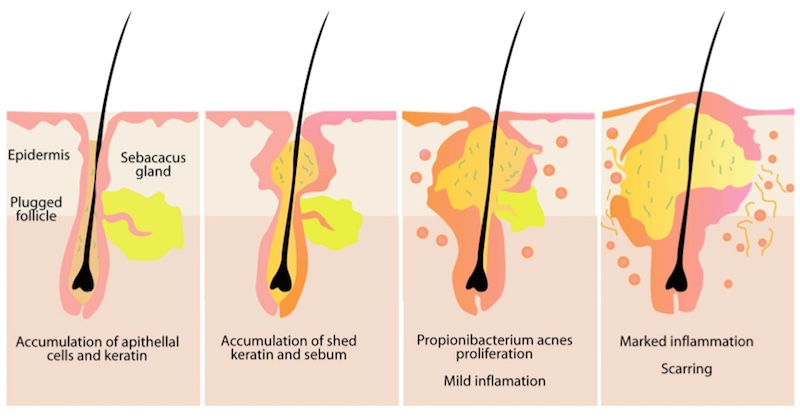The Link Between Acne, Hormones And Liver That Very Few People Know About
Last updated on
To understand acne, it always helps to understand what our skin was meant to do in the face of a particular condition, and then support it in going back to that level of functioning.
Generally speaking, the purpose of our skin is:
- To protect our body from the external colonization of microbes
- To keep us hydrated and warm (protect our internal organs)
- To allow us to release heat through sweating
- To help us to produce vitamins on the skin surface
- To protect us from the sun
- To produce oil (through our sebaceous or oil-producing glands) that not only protects the skin barrier, but has the capability of drowning bacteria on our skin surface
- To detect potential stress—nervous system cells detect stress—and directly interface with our hormone systems through cortisol (our stress hormone)!
Where can these methods of protection work against us?
- Overactivity of our sebaceous glands (glands that produce oil in the skin). The sebaceous gland has enough enzymes and essential fats within it that cholesterol can produce testosterone, which in turn produces more oil.
- An inability of the skin to protect us properly against microbes on the surface, resulting in infection.
- Excessive inflammation.
- Over-response to our hormone systems.
Knowing these things, what does this have to do with our digestive tract?
Our digestive tract is capable of producing bacteria in the digestive tract that directly influence the skin and its own colony of beneficial bacteria. These bacteria are capable of reducing inflammation, supporting immune defense, and absorption/production of essential nutrients and vitamins.
Vitamin D
We know that there are immune molecules in the digestive tract that influence the total amount of vitamin D in our body. Vitamin D, when not absorbed strictly through the skin can be ingested and is able to boost the skin levels of vitamin D.
Vitamin D increases certain molecules called cathelicidins in the skin surface that act like immune boosters, and directly increase immune cells which kill certain bacteria. This is important for acne as the bacterium P. acnes is known to colonize sebaceous (or oil-production) follicles, which can lead to infection and the hot, sore breakouts that are more cystic in nature.
Eating The Proper Foods
As much as we all love dairy products, and they are important for calcium and as a protein source, they are known to worsen acne. Dairy products contain steroid hormone precursors to testosterone that drive sebaceous gland functioning, including other growth factors.
If you think about it, it is milk from an animal used to help nurture and grow their infant (cow, sheep, goat), and as a result it will have hormones that can influence your own hormone pathways. Insulin growth-factor 1 is elevated when milk is consumed through an elevation in blood sugar and insulin levels.
This is most prevalent in teenage years when steroid hormones are more active. Cortisol, a stress hormone, is directly involved in the increase in insulin, and so not only is milk or milk products affecting hormone pools in general, but add in a pinch of stress and things really get going.
Sugar loves to induce inflammation
Sugar always makes acne worse. It basically permits inflammation to increase and run freely.
How To Reverse These Processes?
1. Reducing inflammation throughout the body.
Fish oil is an essential fat, meaning if you do not get get it through your diet, you will not have it! Fish oil is anti-inflammatory, working in the same pathway that can Advil. With time, a reduction in the number of breakouts as well as redness and swelling in the area of the gland is facilitated.
2. Increasing the numbers of good bacteria through probiotic therapy
This will not only facilitate immune balancing and beneficial immune cells, but also ensures we are having adequate bowel movements daily. Our skin is an organ that does eliminate wastes (through sweat); if the digestive tract is not moving regularly this does impact the skin.
3. Balancing our hormone system
Many herbs can assist the endocrine (hormone) system to become more balanced, with the guidance of your doctor.
4. Keeping the harmful bacteria under check
Echinacea species are known to support the growth of good immune system factors at the same time as reducing inflammation. Studies are showing that with continued use it can act similarly to an antibiotic in reducing the infection numbers at the skin surface.
5. Supporting liver health in the digestive tract
Mommypotamus puts it like this:
“Caffeine, alcohol, processed sugar (fruit and honey are usually okay in moderate amounts), etc. damage our digestive tracts, which are our first first line of defense when it comes to deactivating toxins and pathogens. Eliminating problem foods may not be enough to heal holes created in the gut lining (called “leaky gut”).
If steps are not taken to repair the holes, proteins and other food substances will pass into the bloodstream in their undigested state. The liver will be overwhelmed and the body, who doesn’t recognize these proteins in their whole forms, will launch an attack (create antibodies) against these proteins. This kicks off a domino effect which can lead to eczema, asthma, ADD, and other [skin] problems.”
With all skin conditions, the true triggers for each person are unique. Patience is undoubtedly one of the most important virtues in getting acne under control.
This article is shared with permission from our friends at draoife.com (in partnership with FamilyLifeGoals.com)
Some of the links I post on this site are affiliate links. If you go through them to make a purchase, I will earn a small commission (at no additional cost to you). However, note that I’m recommending these products because of their quality and that I have good experience using them, not because of the commission to be made.

































 JOIN OVER
JOIN OVER
Comments